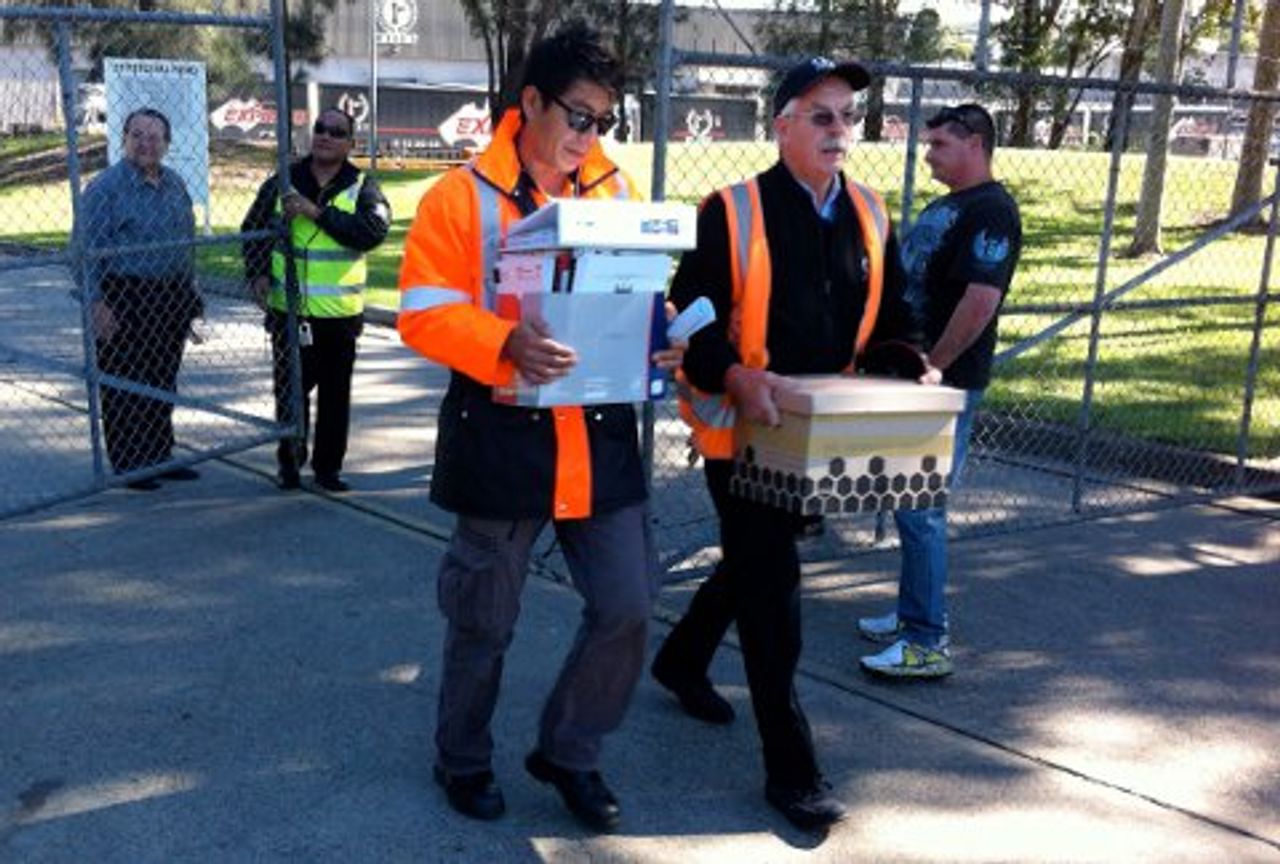In another sign of the deepening recession hitting Australia’s retail, manufacturing and service sectors, the national transport company First Fleet went into receivership this week and locked out 1,000 workers from its depots in Queensland, New South Wales, Victoria and South Australia.
 Dismissed workers leaving First Fleet, Smithfield
Dismissed workers leaving First Fleet, SmithfieldNotice of the decision, which was taken by deVriesTayeh administrators, was posted on the First Fleet’s web site at 11.55 p.m. on Wednesday. Some truck drivers were already 2-3 hours into their trips the next day when they received information about the closure and were told to turn back. At least 600 employees and more than 300 contractors will lose their jobs, wages and entitlements.
While no official explanation has been given as to why the company was shut, deVriesTayeh declared it was “due to the director’s inability to meet certain pre-arranged commitments.”
None of the workers was given any warning of the intentions of the company or administrator, despite the fact First Fleet had entered voluntary administration on April 26. Company management had repeatedly told workers that since the administration was “voluntary” their jobs would be safe.
More than 300 First Fleet contract drivers have not been paid for up to two months, while permanent staff are owed between one and two week’s salary and, according to some workers, up to $15,000 in entitlements. First Fleet drivers told World Socialist Web Site reporters outside the company’s Smithfield depot in Sydney that the company had also stopped making regular superannuation payments during the past two years.
First Fleet, which was established in 1988 and expanded via the takeover of other smaller local companies, is one of Australia’s largest privately-owned trucking and logistics supply firms. It provides door-to-door delivery of commercial goods nationally and operates warehouse management and logistical services, with clients in the recession-hit retail and manufacturing sectors.
Indicating the impact of recessionary trends on the company, one First Fleet senior employee told the WSWS that the company had not signed up any new large customers in the last seven years.
The trucking and freighting industry is dominated by large companies such as Linfox, Toll Holdings and the South Australia-based K&S, which sub-contract their transport services to smaller operators. These make up to 80 percent of total road freight.
Contract drivers are coming under increasing financial pressure, with transport companies withholding payments for work done by 45 to 60 days and also imposing greater operating burdens. Contractors are being hit with higher fuel, registration and other running costs.
Transport firms rely on business from retailers and manufacturers. According to the Food and Grocery Council’s CHEP Retail Index, retail spending growth has fallen nationally from an average of 5.2 percent in 2000-2010 to 2.5 percent in the year to February 2012. Retail growth in Victoria only reached 2 percent and in New South Wales it was less than 1 percent. Yesterday, major department store retailer Harvey Norman announced a 44 percent fall in its operating profits for the third quarter of this financial year.
The response to the First Fleet collapse from the federal Labor government and the Transport Workers Union (TWU), which has overseen the destruction over almost 18,000 full and part-time jobs in the transport industry over the past four years, was entirely predictable.
Federal Employment Participation Minister Kate Ellis issued a perfunctory media release stating that the administrators have been “awfully abrupt” in their treatment of the First Fleet workforce. TWU national secretary Tony Sheldon feigned concern about the company’s closure, denounced major supermarket chains Woolworths and Coles for cost-cutting and driving down contractors’ margins, and claimed that union officials would be “fighting for their [workers’] rights and entitlements”.
This is hot air. The TWU called no mass meetings of employees and contractors yesterday. It told workers that it would collaborate with deVriesTayeh to “relocate” them. In other words, the union, which is meeting with deVriesTayeh administrators on Monday, will do whatever it can to ensure an “orderly closure” of the company.
The TWU’s response to the First Fleet closure makes clear that workers can only defeat this job destruction if they break from the unions, establish rank-and-file committees and develop a unified campaign with other sections of workers to defend all jobs. This fight can be advanced only to the extent that it is based on a political fight against the entire Labor and union apparatus and for a workers’ government grounded on a socialist program.
***
World Socialist Web Site reporters spoke to First Fleet workers in Sydney and Melbourne yesterday.
Jimmy, a local deliveries driver in Sunshine, Melbourne, said: “Everybody arrived at 4.30 a.m. and the administrators locked us out. The company is insolvent and they’ve told us to look for other work.
“I’ve been there for eight years,” he continued. “Today I have one day’s work and that is because Nestlés is paying for me to take their products in this truck to them—they are all perishable goods, so they wanted to get them out of there.
“There is nothing for any of us. There are about 12-13 storemen next door, and they are locked out as well. There are hundreds of workers in Sydney, Melbourne and Brisbane, and we’ve all ended up with nothing.”
 Bob Pearce
Bob PearceBob Pearce owns the security company that is sub-contracted by First Fleet’s depot in Smithfield, Sydney. He said: “I’m a sub-contractor and I still haven’t got my termination certificate. I’m never going to get my money and I lost $50,000. There won’t be any assets by the time they go divvy it up to creditors.”
Pearce estimated that it would be 6 to 8 months before any worker received any money.
 Doug Smith
Doug SmithSmithfield driver Doug Smith, 46-years-old and with 22 years experience in the transport industry, said that First Fleet had not paid his superannuation for a couple of years, and that he had 600 hours of annual leave and long-service owing to him.
“It’s just heartbreaking after 14 years [with First Fleet],” he said. “I get a phone call at 1:30 a.m. to say the gates are shut.
“I’ve just worked last week and this week for nothing and I’ve got however long it takes me to get another job. So there’s going to be basically a month where there’s going to be no income. Is the bank going to say to me, ‘Well, we won’t worry about taking money off you for a month till you get your job and yourself sorted’?
“Is my ex-wife going to say to me ‘No, don’t worry about child support for the next month’? Of course they’re not, and I’m not the only one in this situation. I know there’s thousands in this exact same boat. Worldwide there would be millions.”
Smith said that 60 jobs were going to be axed at Linfox and another 100 at a company “around the corner”.
“If I find another job and if I have to be in the union then I will,” he said, “but I won’t have anything to do with it. I’m sure the TWU had an idea of what is going down here. When there’s trouble we don’t hear from them until it’s too late, like today. [TWU National Secretary Tony] Sheldon said ‘We’ll represent you to get your entitlements’, but that doesn’t justify taking $500 [in union fees] a year.”
Commenting on the future confronting young people, Smith said: “What has the next generation got to look forward to if they’re seeing their parents losing their jobs? I’ve got three girls and one boy and I think my boy is going to find it very hard because he’s like me. I’ve got no education, I’ve got no trade behind me, so this is what I know. But I don’t want my kids to grow up being in this game, because basically it’s a mug’s game.”
